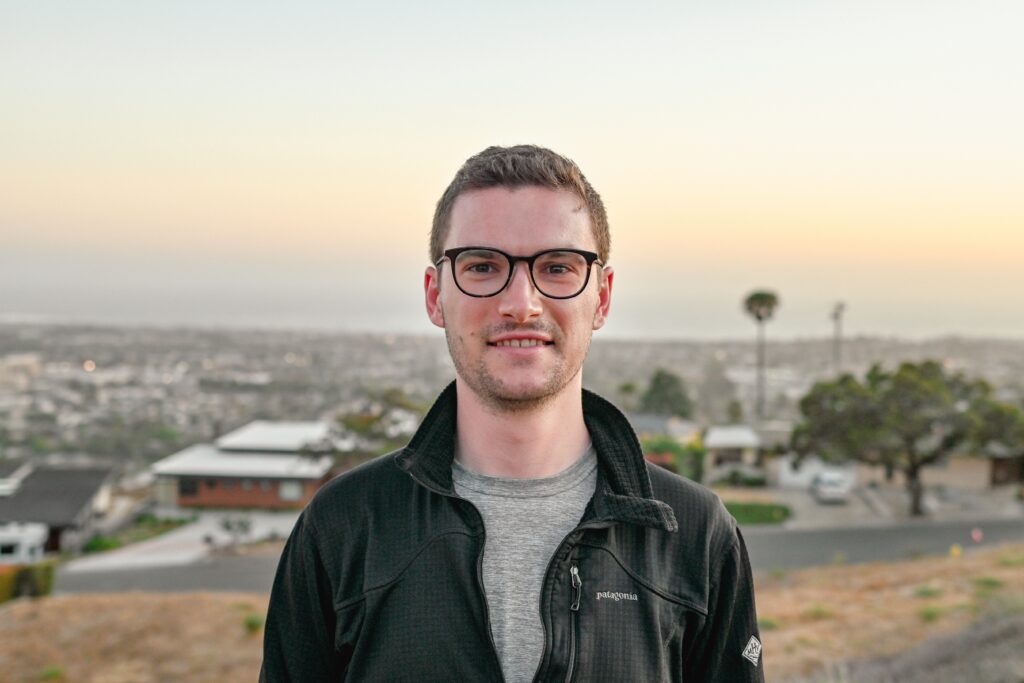CCT Alumni Highlight: Ryan Powers
Posted in Announcements

CCT is excited to highlight Ryan Powers (CCT ‘23), who is part of the second cohort of the U.S. Digital Corps as a Fellow at the Department of Veterans Affairs (VA). In this role, Ryan helps create a better customer experience for Veterans and their families to access the benefits they’ve earned. We asked Ryan about his time at CCT, how he learned about the fellowship opportunity, and his work as a product manager within the VA.
How did you find out about this fellowship opportunity?
In my first semester, I took a class offered by McCourt called “Public Interest Technology” taught by Emily Tavoulareas (mostly because the course description sounded interesting). The course showed how technology, policy, and public service can come together in one space. Emily worked for the U.S. Digital Service earlier in her career and shared several opportunities for interested students to get involved in civic tech— one of which was U.S. Digital Corps. I was immediately sold and spent the rest of grad school positioning myself to apply!
What was the application process like for this fellowship?
The application process is quite long, but with very defined stages. You start by submitting your resume. If you meet basic eligibility requirements, the next stage is a track-specific written assessment. Candidates that make it past the written assessment will have an interview with a subject matter expert. After the interview, the remaining candidate pool will begin the agency matching process, where you may receive matches based on your skills, background and interests to projects across participating agencies. The candidate will interview with these agencies, often a panel interview. One of my matches was the Department of Veterans Affairs (VA) Office of the Chief Technology Officer (CTO) that ultimately yielded an offer. In total, the process spanned from the mid-November resume submission to receiving a conditional offer on May 1, pending a background check.
How did your CCT degree help you get this fellowship?
CCT helped me towards this fellowship by allowing students the freedom to immediately take electives in the first semester. Emily’s class not only gave me an awareness of civic tech, it allowed me to shape nearly all of grad school around my goal. I ended up working for the Beeck Center for the remainder of my program, which provided a great foundation for joining the U.S. Digital Corps. The Beeck Center’s student analyst program was a great “first stop” for me as someone interested in civic tech.
What was your focus at CCT and how are you applying that at the U.S. Digital Corps? Were there any courses that you took at CCT that really stand out for you? Do you recommend any particular courses to students looking to go into a similar field or career trajectory as you?
I focused on the intersection of emerging technology and public policy. CCT has a robust course offering in this area, but I also found myself drawn to courses offered by McCourt and the Walsh School. The three courses that really stand out: Public Interest Technology (McCourt, Emily Tavoulareas), Global Cyber Policy (CCT, Dr. Laura DeNardis), and Digital Law & Policy (CCT, Dr. Meg Jones). At the VA Office of the CTO, our high-level mission is delivering software for veterans that works, and on the chatbot team, specifically, I find our work always has a tech policy layer. That interdisciplinarity and “working without all the answers” is something that was ever-present for me at CCT.
In terms of course recommendations, the three I mentioned are a great start, but there are countless others that I simply didn’t have a chance to take. What was arguably more impactful was my work at the Beeck Center, which allowed me to really learn civic tech as a professional space, network, and build a foundation for when I finally could land a role on a digital service team (whether that was federal, state, or local). My advice to CCTers is to think outside the classroom and join the community you want to work with after graduation.
What are you most excited about for this fellowship and more particularly about working at the Department of Veterans Affairs?
Working at the Department of Veterans Affairs, I get to come to work every day excited to solve hard problems and improve the digital experience for veterans who served our country and earned their benefits. Our job is to make sure *all* Veterans can access benefits and critical information seamlessly across all platforms and devices. It’s a privilege to work with an amazing team to achieve that mission, especially as a career-changer who is new to government.
What do you see as outstanding customer experience? (Working on creating a better customer experience for veterans)
The connection between technology and public policy is critical and something I find fascinating. Say Congress passes a bill mandating some benefit (for a recent veteran-focused example, see the PACT Act). Once the bill is signed into law, the real work begins. The success of implementation – i.e. citizens receiving benefits – depends on countless stakeholders downstream of Congress, including the technologists tasked with bringing the digital experience to life. That cycle is something I keep front-of-mind as I think of the context for my team’s work and my specific role.
